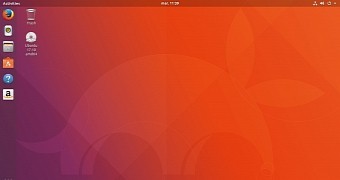Ubuntu contributor Didier Roche continues his development on the look and feel of the upcoming Ubuntu 17.10 (Artful Aardvark) operating system, and today he announced that Ubuntu Dock is getting adaptive transparency.
Canonical confirmed that Ubuntu 17.10 would come with the GNOME 3.26 desktop environment by default, though the default session has suffered numerous modifications compared to the vanilla one to make things easier for those using the Unity interface on Ubuntu 17.04 (Zesty Zapus) or Ubuntu 16.04 LTS (Xenial Xerus).
Most probably, Ubuntu 16.04 LTS users won't upgrade to Ubuntu 17.10, but we're sure Ubuntu 17.04 users will because it'll reach end of life in about four months from the moment of writing, sometime in January 2018. Therefore, Canonical wants to make their Unity to GNOME transition as painless as possible.
Some things are missing, of course, but at least Canonical tried to make GNOME look and feel like Unity, especially by implementing their own dock, called Ubuntu Dock, which will soon receive adaptive transparency, meaning that it will adapt its transparency to apps when they touch the dock (watch the first video below).
"The idea I raised upstream was thus to consider all [GNOME] Shell UI (which is, in the Ubuntu session the top panel and Ubuntu Dock) as a single entity. Their opacity status is thus linked, as one UI element," explained Didier Roche in his latest report. "The results is way more natural."
Adaptive transparency is enabled by default for Ubuntu Dock
Last time we talked here about the Ubuntu Dock, we told you that it's based on the popular Dash to Dock extension, and even uses its settings, which means that you can still use it instead of Ubuntu Dock. But if you decide to stick with Ubuntu Dock, you should know that the adaptive transparency behavior is enabled by default.
Didier Roche and the rest of the team made sure that adaptive transparency works well with Ubuntu Dock's settings exposed in the Settings apps, including intelli-hide and screen position. You can watch the second video attached below to see Ubuntu Dock in action on Ubuntu 17.10.
All in all, things are looking good for Ubuntu 17.10, and if you can't wait until its official launch next month on October 19, you'll be able to download and install the Final Beta next week, on September 28, 2017. Until then, if you're using the daily builds, you can take the latest Ubuntu Dock for a test drive using the transitions PPA.

 14 DAY TRIAL //
14 DAY TRIAL // 
